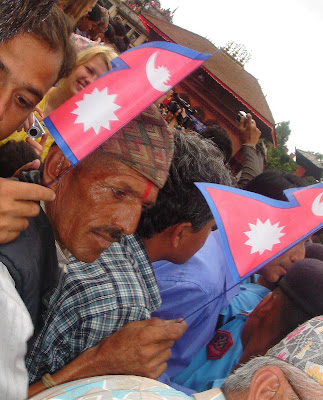Kathmandu
Often people in India ask me, "So what does the name Nepal mean, anyway?"
I always have to say, "They really don't know."
A., a friend from Berkeley, expressed disgust at this (with what I have  come to regard as typical West Coast arrogance). "I don't really believe that they DON'T KNOW!"
come to regard as typical West Coast arrogance). "I don't really believe that they DON'T KNOW!"
 come to regard as typical West Coast arrogance). "I don't really believe that they DON'T KNOW!"
come to regard as typical West Coast arrogance). "I don't really believe that they DON'T KNOW!" Oh sorry, I guess I'm just really stupid....and the entire four years I've been travelling here all the things I have read are wrong. It's just ME that doesn't know...someone much smarter out there actually does know.
So the next time someone asked (Y., and Indian-American friend in Delhi), I gave two of the several theories: "Some believe it was derived from the Newar, the original inhabitants of the Valley [Of course, this raises the question - what does the name Newar mean?] .
Others say it is a Sanskritic word from 'Nepalaya' - that is, place where the traditions are observed."
Which it certainly is. This is a country in which the Prime Minister of the supposedly secular state now receives prasad (a blessed item - in this case, a sweaty sacred handkerchief) from the ancient god Bhim, instead of the King, who had traditionally received it.
"The place where traditions are followed," repeated Y. That seemed to satisfy him.
The fact is, though, they actually DON'T know for sure what the name Nepal means.
Here are just a few of the popular theories, according to Wikipedia.
The word Nepal is believed to derive from Nepa (नेपा:); the old name of Kathmandu valley was Nepa in Nepal Bhasa, the language of Newars, who were the early inhabitants of the valley, long before the unification of Nepal.
[Again, what does the name Nepa mean? Viewer mail welcome.]
Other toponym theories include: -
"
It has also been suggested that the name comes from the Tibetan niyampal, which means "holy land".
A third theory suggests that Nepal came from combounding the words NE, which means wool, and PAL, which means a tented house; long time ago, Nepal used to produce a lot of wool and the houses were used to store the wool - hence the word NE-PAL.
The name, Nepal, is also supposed to be derived from the Sanskrit word "NEP"(नेप), with the suffix "AL"(आलadded) to it; though still under controversy, NEP were the people who use to be cow herders - the GOPALS (गोपाल) - who came to the Nepal valley for the first time from the Ganges plain of India.
According to Nepali scholar Rishikesh Shaha, the ancient chronicles report that, a sage (muni) named Ne became the protector (pāla) of this land and the founder of its first ruling dynasty. The name of the country, Ne-pāla, therefore originally meant the land 'protected by Ne.'[1]
Everything I need to know I learned from a T-shirt
The popular 1970s Hippie etymology (which can still be found on t-shirts) was: "NEPAL stands for Never Ending Peace and Love."
My vote is for: "Never Ending Politics and Load-Shedding."














6 comments:
Ive heard two.
one is that there was a muni (also mentioned inthe skanda purana) called Ne whose protection Ne-pal was.
Two that ne means sheeps wool and nepal is the place where sheepswool is grown, hence nepal. Newar also comes from a similar derivation. place where people keep sheep.
As a kid, I visited an international fair in Switzerland, where Nepal was a guest country. I bought a wooden relief representing some deity/demon crushing the heads of two serpents in his mouth.
I had great difficulties to communicate with the Nepalese who sold it to me, and when I asked the name of the deity/demon, he replied "Nepal".
It was probably a misunderstanding, but for a long time I believed that Nepal meant some deity crushing the heads of two serpents (in my mind, those represented China and India).
The problem with westerners is they want everything in black and white. You want to try to find the origins of the name of Nepal. It is impossible because the histories of the Indian sub continent have been so distorted by White people (especially the British) and the names anglicised because they could't pronounce them.
Moreover there has been no scientific enquiry/ research carried out locally. Because most research is conducted by West-aping and enamoured-by-west scholars who take vicarious pleasure in deriding and denouncing everything that is associated with Sanskrit, India, Hinduism etc.
Gee, I guess that is "the" problem with Westerners, all of them. Would you like to know "the problem with" Nepalis?
---You want to try to find the origins of the name of Nepal.---
No, I don't. I said that other people often ask me this question.
--Moreover there has been no scientific enquiry/ research carried out locally.--
Whose fault is that, and what are you doing about it? You seem pretty enamoured with the west yourself, judging by your profile pic.
In other words, you, also, do not know. You have nothing to contribute to the conversation, and can only deride those who ask valid questions.
Paul Wagner writes:
You should ask your Berkeley friend, or any American, what "America" means.
--Actually, I'm American and know exactly what it means, or at least its origins. The name America is just a corruption of the name of Amerigo Vespucci, an Italian navigator. There is no mystery about this - it's common knowledge - and I've never heard any other explanation.
"The problem with westerners is they want everything in black and white. You want to try to find the origins of the name of Nepal."....
In fact, not only did I, a westerner, NOT ask this question, it was asked by my Indian friend.
PLEEEEASE read carefully. Correcting your inattentiveness is so tiresome.
Post a Comment